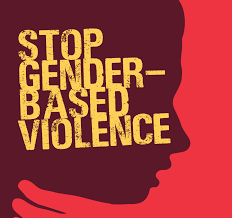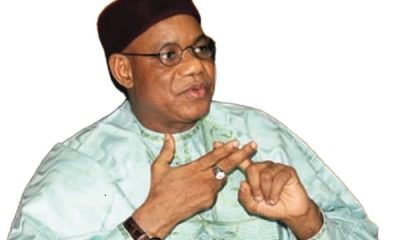FEATURES
GBV: Who will Save the Women?

The alleged murder of 21-year-old Christianah Idowu by her friend Ayomide Adeleye at the Federal University of Agriculture, Abeokuta, chillingly highlights the pervasive threat of Gender-Based Violence (GBV) in Nigeria.
Adeleye is also suspected in the deaths of his sister and girlfriend, adding to the alarming pattern of violence.
This tragedy, alongside the horrific rape of 14-year-old Mercy Vangervihi and the murder of 54-year-old Mrs Adene Iyabode by their young neighbours/employee for N150,000 underscores the urgent need to address this critical issue.
These are not isolated cases. These incidents reflect a larger, global problem of violence against women and girls.
A UNODC and UN Women report, “Femicides in 2023,” reveals a disturbing trend of intentional killings worldwide.
The report estimates that approximately 85,000 women and girls were intentionally killed globally in 2023.
This underscores the need for immediate action to prevent such violence and protect women and girls.
A staggering 60 per cent of these deaths – 51,000 – were perpetrated by intimate partners or family members.
Femicide, the most extreme form of GBV, encompasses a spectrum of violence, from a husband murdering his wife after years of abuse to a young girl killed by her family for refusing a forced marriage.
Experts attribute these horrific acts to deeply ingrained societal beliefs that women and girls are inferior to men and must be controlled.
In Nigeria, the rising tide of femicide is particularly alarming.
In spite of the existence of legal frameworks like the Child Rights Act (CRA) and the Violence Against Persons Prohibition (VAPP) Act, coupled with public awareness campaigns and investments aimed at ending GBV, the numbers continue to climb.
Iman Sulaiman-Ibrahim, Minister of Women Affairs, at a joint UN Accountability Forum, cited a 2021 National Bureau of Statistics report.
This report revealed alarming statistics: 30 per cent of women aged 15-49 have experienced physical violence, and one in four girls has suffered sexual abuse before age 18.
“These numbers are not mere statistics.
“They are the realities of women and girls whose voices demand to be heard, protected, and empowered, “she emphasised.
The Minister further highlighted the significant economic impact of GBV, stating that closing gender gaps could add N15 trillion to Nigeria’s GDP annually by 2025.
She highlighted the gap between women’s significant economic contributions—owning 41 per cent of SMEs—and their limited leadership representation.
According to her, this disparity is evident in senior leadership positions, 22 per cent and even more so in parliament, where women hold a mere 3.6 per cent of seats.
Mr Sunday Akbakaba, Data Manager at the Federal Ministry of Women Affairs, further emphasised the gravity of the situation, stating that between 2020 and 2023, the national GBV dashboard recorded 27,698 cases of Sexual and Gender-Based Violence (SGBV).
“The economic implications of GBV are also significant,” he noted.
Ms. Beatrice Eyong, UN Women Country Director to Nigeria and ECOWAS, emphasised that GBV extended beyond physical abuse, significantly hindering national development.
“Gender-based violence is beyond a man beating his wife.
“It can reduce the nation’s economic growth. Nigeria will never rise above poverty if GBV is not reduced,”she said.
Ms. Grace-Sim Auta, a legal practitioner and coordinator at Hope for the Village Child Foundation, Kaduna State, identified key challenges in addressing gender-based violence (GBV).
These challenges include significant delays in court proceedings and bureaucratic bottlenecks that hinder timely justice.
Auta also pointed to a lack of cooperation from victims and their families, often stemming from fear of social stigma and further repercussions.
Mrs Elizabeth Duile, Chief Operations Officer of Civitas Auxillium Foundation (CAF), cited weak law enforcement, ingrained cultural norms, insufficient survivor support, limited community engagement, and inadequate education as major contributing factors to GBV.
Stakeholders also agree on the crucial role of the media in combating GBV.
Mrs Chizoba Ogbeche, Vice-President of the Nigeria Association of Women Journalists (NAWOJ), urged journalists to amplify the voices of victims and survivors and hold authorities accountable.
The 2024 annual 16 Days of Activism against GBV campaign, themed “Towards Beijing +30: Unite To End Violence Against Women,” calls for concerted action to eliminate violence and create a safe society for women and girls.
In spite of the daunting challenges, the experts say there are signs of hope, as increased awareness, ongoing law enforcement efforts, and growing women’s empowerment initiatives offer a glimmer of light.
They agreed that maintaining momentum and achieving change requires several key elements, which include continuous pressure from civil society organisations and strong partnerships with traditional leaders.
They say sustained international support is also crucial to ensure that the voices of Nigerian women are heard and that progress, even if gradual, is achievable.(NANFeatures)
FEATURES
When Will The Road Killings Stop?

By Sale Rusulana Yanguruza
Nigeria has today counted and witnessed multiple killings of innocent people and bombings of citizens on the roads from different angles in the South and some Northern parts of Nigeria. Unfortunately, none of the perpetrators have been brought to face the wrath of the law.
In less than two months, 16 hunters were killed by mob youth in Uromi, Enugu State, and the details about those arrested and suspects are still undisclosed to the members of the public.
Their families and the Hausa people are mourning the death of these innocent individuals who were brutally killed, but the silence of the government is devastating. Even the compensation that Governor Abba Kabir Yusuf promised and requested from the Edo State government is still unclear to the members of the public.The most devastating aspect of the road killings is that most of the victims are Hausa or Muslim, simply because they are from the North. How can traveling on the roads be a reason to kill a citizens? Why are Hausa and Muslim individuals always the victims ? Is it only hausa people traveling by the road in Nigeria?
Even though the answers that these youths usually give is that Fulani and terrorists are killing them overnight, that is not a reason to block roads and kill innocent people. They should know that Zamfara, Katsina, Kaduna, Niger, and Borno States are facing insecurity challenges like kidnapping, Boko Haram and Fulani clashes for over a decade, but none of the people from these states view a particular tribe or religion as the cause and use roads to kill innocent people.This act should be stop!
No doubt, Constitutionally, every individual in this country is entitled to move anywhere and leave wherever he/she wish to leave but unfortunately for Hausa and some Muslim individuals, traveling by road seems to be considered a sin by some youth, leading to serious punishment, which is barbaric killings by their so-called fellow citizens who do not have emotional feel for human being and their compatriots citizens .
I believe that in Nigeria, no tribe is exempt from traveling from one place to another. However, it’s saddening and regrettable that the Hausa people are disproportionately affected and become victims of road killings, and the government is still yet to take necessary actions to deal with such inhumane and unfathomable actions carried out by some groups.
The most terrible and gruesome aspect of such acts is that every day, the situation rises to an unbearable and unacceptable level. It’s imperative and necessary for the government to end these ongoing road killings before it will escalate to an uncontrollable level.
The government shouldn’t limit its activities to only condemning and sending condolence messages to the families victims of these inhumane and unfathomable killing of innocent people; actions must be taken, and the punishment of those involved in such road killings must be brought to public eyes.
No doubt, swift punishment would aid in reducing these ethno-religious killings in the country and would serve as a reference and warning to such mob groups that the government is prioritizing and exercising its constitutional duties as a government in protecting the lives of its citizens who are brutally killed and burned.
Doubtless, Most of the victims are from Kano State, where the majority of travelers from all 36 states enter the state everyday to carry out their business activities, considering the state as a center of commerce. Still, none of the travelers from other ethnic groups were killed and burnt in Kano. Why do some groups choose to reward these people with the killings of their own brothers and sisters ?
It’s very alarming to note the numbers of Northerners killed simply because they’re traveling is rising every month, with no concrete reasons to justify their offenses, but merely due to their identity as Northern Muslims or Hausa by tribe. Additionally, Truck drivers have continuously faced these killings over the past eight years, yet no actions have been taken to avert further escalation and end it permanently.
In one editorial written by a popular newspaper in Nigeria, it’s reported that over 50 drivers have been killed and even burned their goods with some still missing due to this animalistic attitude of road killings. In May 2022, a pregnant woman, Harira Jubril, 32, and her four children were killed in the Orumba South Local Government Area of Anambra State. Even those who committed this act haven’t faced the wrath of the law.
One may ask: Is the government truly ready to end these barbaric killings that keep surging towards a particular or specific religion or tribe? Regrettably, in 2023, a group of mob killed about 20 people who were going for religious activities. All of them are Muslims. But who are the suspects, where are they, and what actions has the government taken on the perpetrators?
The people who killed those going to Maulud are the same people who recently killed those going for a wedding in a University Bus carrying the name of Ahmadu Bello University Zaria written in bold with a plate number to stop them and killed and burnt the car . What offense do they commit? How can a University bus carry terrorists and travel on the roads? The most disheartening aspect of these barbaric and animalistic acts is that they’re killing and burning people and still celebrating the deaths of these individuals; taking video footage-How heartless!
Do you think the government punishes those who killed the people going for Maulud, the Uromi 16, Harira Jubril and her four children, in public? The mob group would never dare attempt to do it again, sadly what is happening now is worrisome because the inactions is making the situation to take another dimension.They may believe that since several incidents, no actions have been taken to punish and bring them to book publicly, so it’s okay to repeat it again.May be it’s for this reason, recently, some of the mob group from Benue state killed Jamilu Ahmad and Barhama Suleiman who are from Kano State just in less than a week plateau group killed 13 and injured others.
Advisedly, the government and stakeholders must come up with security strategies and measures that will bring an end to these road killings. This can be achieved by updating the public about those arrested and who committed this animalistic act, to bring them to book and let the world know they have been punished.It’s notable that they celebrate the killing of people, take videos, and share them publicly, showcasing what they’ve done. If they can confidently act in such a manner, why is the government not updating the public about what happened to them after they’ve been arrested and taken to court?
| ReplyReply allForwardAdd reaction |
FEATURES
Broken Trust: How Banking Policies Are Failing the Nigerians

By Princess Ngozi Ibiwari Odibueogwu
In a nation still battling economic disparity, inflation, and a fragile middle class, one would expect that accessing basic financial services would be seamless, especially for loyal customers. Unfortunately, that is not the case for qmany Nigerians, particularly those who operate personal accounts for genuine and honest purposes.
Recently, I had a sobering experience that all reflects a disturbing trend in our financial system.
After using my bank account for nearly seven years, I returned to the bank to upgrade and reactivate the account, which had gone dormant. To my utter dismay, I was informed that in addition to submitting valid identification, I would also need to swear a court affidavit—a legal document requiring time, effort, and money.When I questioned the rationale for this requirement, the response was simply: “It’s for verification; we need to be sure the documents are real.” Real? Documents from the same customer who has been with the bank for years? The logic was not only baffling but dehumanising. I walked away not just inconvenienced, but heartbroken by the realization that our banking policies often treat law-abiding citizens with undue suspicion.
Here lies the bitter irony: while ordinary Nigerians are made to jump through hoops to access accounts holding their hard-earned money, individuals with questionable wealth—sometimes amounting to billions—are rarely asked to swear affidavits about the source of their funds.
We have seen how some bank accounts linked to fraud or corruption contain obscene amounts of money, yet those individuals are not required to bring affidavits from courts.
They are not told their documents need “verification” or that their banking activities are under scrutiny. Instead, they are welcomed with open arms—given VIP treatment, sometimes with personal relationship managers and zero friction.
What then is the role of our banks? Are they truly serving the public interest, or have they become gatekeepers for the elite and tormentors of the average Nigerian?
A System Designed to Discourage the Honest
Banking institutions are supposed to be facilitators of progress. They are entrusted with the savings of the people and expected to empower citizens by providing fair access to services. Instead, they often impose tedious bureaucracies that frustrate genuine customers. From endless paperwork, slow customer service, hidden charges, and now, legal hurdles like affidavits for simple account updates, the system increasingly feels like it was designed not to serve, but to discourage.
Imagine a widow trying to withdraw the savings of her late husband only to be asked for court affidavits, local government certificates, next-of-kin letters, and even publication in a national newspaper—just to access N200,000. Now contrast that with a politically exposed person accused of corruption who moves N10 billion through multiple shell accounts with barely a raised eyebrow. Where is the justice?
The Failure of KYC in Practice
The Central Bank of Nigeria (CBN) mandates banks to implement Know Your Customer (KYC) protocols. This is meant to combat money laundering and financial crimes. However, in practice, KYC seems to only apply strictly to the poor. The elite are rarely subjected to the same rigorous checks.
A tailor who wants to open an account is asked to bring utility bills, a referee, BVN, two passport photos, and in some cases, a letter from a religious leader. But someone who wants to deposit ₦500 million in suspicious cash? They are offered a cold drink and guided to a private room. This double standard perpetuates distrust and creates a class divide in a system that is supposed to be inclusive.
Trust: The Missing Currency
Banking, at its core, is built on trust. People deposit their money with the belief that the bank will protect it and treat them with fairness and dignity. But when honest citizens are treated like criminals, while the actual financial criminals are treated like royalty, that trust is destroyed.
Many Nigerians, especially those in rural and semi-urban areas, no longer see banks as allies. This is one of the reasons informal savings groups and “ajo” cooperatives are still thriving despite their risks because they treat people like people, not like suspects.
The Call for Reform
It is time for Nigeria’s banking industry to reflect and reform. Policies must be reviewed not only for compliance but for compassion. The regulators CBN and the Nigerian Deposit Insurance Corporation (NDIC)—must hold banks accountable, not just in terms of capital reserves and risk exposure, but in how they treat their customers.
We need policy frameworks that protect both national security and human dignity. Yes, verification is important, but it should be proportional and reasonable. It should not place undue burden on the very people the banks are meant to serve.
Conclusion: Build for People, Not for Profit Alone
Nigerians are not asking for special treatment. We are simply asking to be treated fairly. For too long, our financial systems have rewarded dishonesty and punished integrity. This must change.
The next time a customer walks into a bank to reactivate their account, they should be greeted with respect and efficiency—not suspicion and red tape. And the next time a massive deposit is made without a credible source, it should trigger the same level of scrutiny—if not more.
Because justice should not be for sale, and trust should not be broken especially by the very institutions we depend on.
| ReplyReply allForwardAdd reaction |
FEATURES
Examining Nigeria’s Approach to Defeating Sickle Cell Disease

Each year, the globe commemorates World Sickle Cell Day (WSCD) on June 19, an event to raise awareness about Sickle Cell Disease (SCD), one of the most common hereditary blood disorders in the world.
The theme of the global observance for 2025 is “Global Action, Local Impact: Empowering Communities for Effective Self-Advocacy”, resonating across the corridors of academia, clinical settings and advocacy platforms.
SCD is a group of inherited blood disorders characterised by abnormally shaped red blood cells that resemble crescents or sickles.
The cells can block blood flow, causing severe anaemia, episodes of severe pain, recurrent infections, as well as medical emergencies like strokes, sepsis or organ failure.
In Nigeria, home to the largest population of people affected by SCD, the day carries a deeper, more urgent significance.
The burden of Sickle Cell Disease (SCD) in the country continues to strain the nation’s healthcare resources and families affected by the disorder.
This growing challenge calls for comprehensive and sustained intervention across prevention, treatment and education.
Without urgent action, including newborn screening, public awareness and access to advanced therapies, the impact on families and the healthcare system will continue to deepen.
It is a timely call for national unity in curbing the spread of this life-altering disease and improving the lives of those who live with it daily.
With an estimated 150,000 Nigerian children born each year with the disorder, according to Harvard’s Dr Maureen Achebe, the country finds itself at the epicenter of a public health crisis.
While prevention remains the ideal, early diagnosis through newborn screening is a practical and effective tool that could reduce mortality among children under five.
Achebe, a renowned hematologist and global health equity advocate from Harvard, said “these babies look normal at birth”, warning that without early detection, mortality rates could reach 50–80 per cent before the age of five, a heartbreaking figure in a country with already strained healthcare infrastructure.
“Newborn screening helps identify those with SCD early so they can receive care and therapy to live normal lives,” she added.
She advocated nationwide newborn screening programme, alongside routine preventive care such as vaccination, folic acid supplementation, and prophylaxis against infections like pneumonia and malaria.
She also dispelled cultural myths surrounding the disease, stating unequivocally that SCD is an inherited genetic disorder, not a curse or result of witchcraft, a reminder of the persistent social stigma surrounding the condition in many communities.
At the heart of Nigeria’s strategy to reduce the prevalence of SCD is prevention, and according to Prof. Patricia Lar, Acting Vice-Chancellor of Yakubu Gowon University, Abuja (formerly UniAbuja), genetic compatibility awareness must be the foundation of preventive approach.
Lar spoke through Prof. Titus Ibekwe, the Provost of the College of Health Sciences, during a public lecture titled “The Evolving Therapeutic Landscape in Sickle Cell Disease,”
She emphasised the importance of prevention as the most effective strategy in eliminating Sickle Cell Disease (SCD) in Nigeria.
She stressed that “seriously considering partner compatibility could reduce the disease to only carriers, discouraging marriages between incompatible partners.
“If we maintain this precautionary measure over time, we will be able to eliminate SCD or reduce it to a minimum world-wide ,” she added.
This message is echoed in the advocacy efforts of Mrs Aisha Edward-Maduagwu, the National Coordinator of the Association of People Living with Sickle Cell Disorder.
She called for the strict enforcement of genotype compatibility checks, especially in states like Anambra, where legislation exists but implementation lags.
“Our association has made significant strides advocating for the rights and welfare of people living with SCD.
“We urge prospective couples to prioritise genotype testing and ensure compatibility before marriage,” she said.
Beyond bone marrow transplants, gene therapy is emerging as the next frontier, according to Lar.
“This revolutionary treatment aims to correct the sickle cell gene itself, potentially offering a one-time cure.
“This is where the future of SCD treatment lies,” she noted. “It modifies the faulty gene to function like a normal gene, potentially eliminating the disease at its source.”
In recent years, the emergence of curative treatments, though limited by cost, has brought renewed hope to families affected by SCD.
The Lagos State University Teaching Hospital (LUTH) has taken significant steps forward, with successful bone marrow transplants performed since 2024.
Dr Adeseye Akinsete, a pediatric hematologist at LUTH, confirmed that all transplanted patients are alive and well, and that the centre is preparing for a third cycle in August 2025.
“This represents a major breakthrough in the country’s medical landscape.
“We are proving that advanced therapies can be delivered locally. Nigerians are beginning to trust and participate in these programmes,” he said.
Akinsete added that LUTH also offers post-transplant support services, including virtual consultations for patients outside Lagos, and has established a dedicated transplant clinic that follows up with patients who received care both locally and abroad.
The Centre of Excellence for Sickle Cell Disease Research and Training (CESRTA) at Yakubu Gowon University is playing a pivotal role in bridging the gap between research and care.
Since its inception in 2015, CESRTA has worked to provide clinical and translational research, skills training, and community outreach.
Prof. Obiageli Nnodu, CESRTA Director and Co-Chair of the 5th Global Congress on SCD, highlighted the Centre’s collaborations with both local and international partners and its mission to make advanced SCD care more accessible and affordable.
Following the recent global congress, the Coordinating Minister of Health and Social Welfare, Prof. Muhammad Pate, announced the upgrading of CESRTA to the National Centre of Excellence for SCD Research and Training, recognising its impact on national policy, research, and education.
In spite of the scientific and medical advances, the social and economic barriers to quality care for SCD patients remain significant.
Dotun Oladipupo, Chairman of the Oladipupo Foundation in Abeokuta, medication for managing sickle cell was extremely expensive.
“Many families cannot afford life-saving therapies. This must change.”
Oladipupo called on the Federal Government to invest more in alternative medicine research, as well as to promote inclusive legislation that gives people with SCD access to equal job opportunities, education, and healthcare.
“We also need bills that protect the rights of those living with the disease, so that stigma and discrimination no longer define their everyday experience,” he said.
The unifying thread running through the events, speeches, and expert recommendations marking World Sickle Cell Day 2025 is clear: community empowerment is essential for lasting change.
Whether through genotype testing campaigns, newborn screening, accessible treatments, or public education, the solutions must be people-centered and government-supported.
As Nigeria leads the global conversation on SCD by necessity, it must also lead by example, transforming advocacy into action, policy into practice, and awareness into impact.
There is hope. There is progress. But more importantly, there is a renewed determination to ensure that future generations are born not just with knowledge of SCD, but with the power and tools to defeat it.(NANFeatures)















